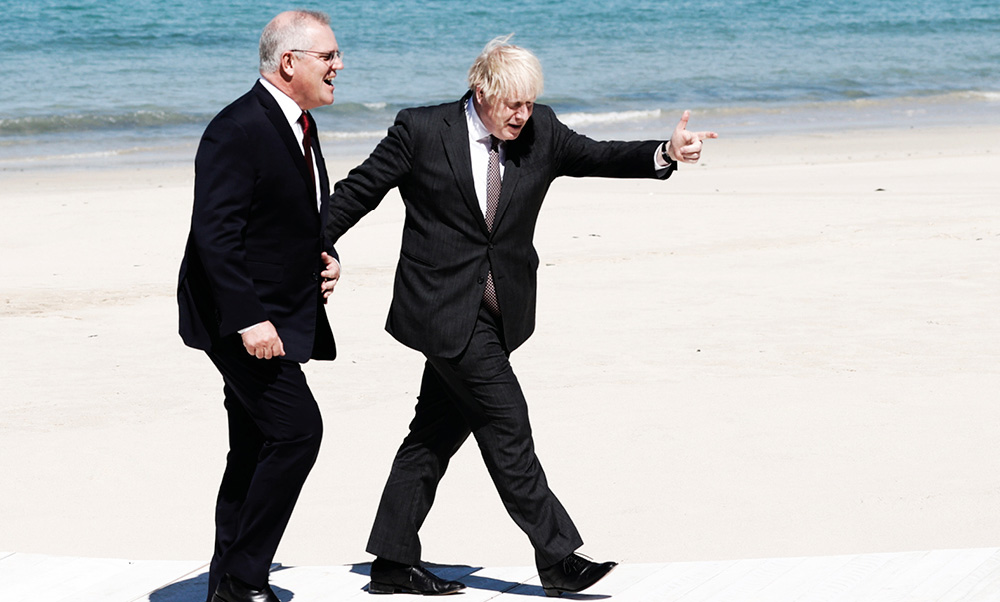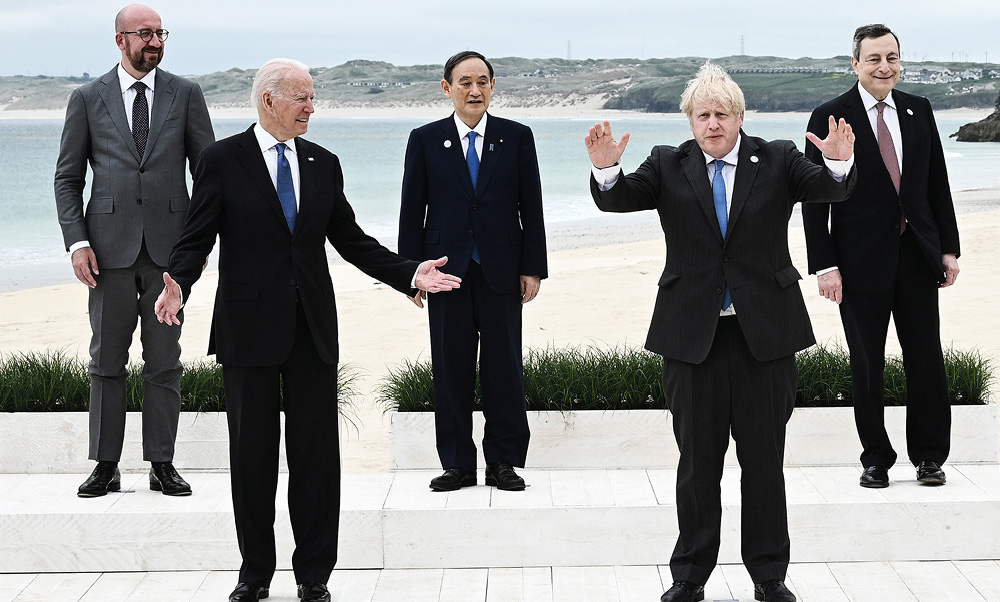Prime Minister Boris Johnson on 11-13 June hosted a summit of the Group of Seven (G7) leaders, billed as an opportunity to demonstrate the global ambitions of the post-Brexit UK. We examine the challenges facing Johnson’s government as it tries to make “Global Britain” a reality.
- The government has yet to turn its ambition to create a Global Britain into concrete policy actions, and the term’s meaning will continue to evolve in the coming years.
- Trade agreements remain a key element of the government’s strategy in this area, but domestic interests will continue to complicate deal-making.
- The G7 summit demonstrates how the government will struggle to make progress with international partners while the post-Brexit status of Northern Ireland remains contentious.
- Nevertheless, pragmatic solutions will be found on areas of mutual interest, such as on combating climate change.
Different things to different people
The government began to use the term Global Britain after the UK voted to leave the EU in 2016. Since then, successive governments have struggled to define what the term means – much less turn it into clear policy goals. Foreign Secretary (foreign minister) Dominic Raab in 2020 indicated that Global Britain had three broad aims:
- “to continue to prove that we are the best possible allies, partners and friends with our European neighbours”
- to be “an energetic champion of free and open trade”
- to be “an even stronger force for good in the world”
In practice, these appear to have manifested as a desire to focus the UK’s attention beyond Europe. The government has yet to convert its free trade ambitions into major new agreements, while it has undermined its pledge to be “a stronger force for good in the world” by cutting its aid budget.
Trade and investment
One early focus of Global Britain was the opportunity for the UK to conclude trade deals on its own terms, rather than as part of the EU. The UK has rolled over many of its existing trade agreements, but progress on new deals has been slow. The UK and Australian governments on 15 June published initial details of the UK’s first major new trade agreement negotiated since Brexit. However, the government will need to do dozens of similar deals to make up for the economic shortfalls of leaving the EU’s single market.
Although symbolically important, the UK-Australia deal has limited economic significance. The terms appear to represent an economic boost of around GBP 0.50 annually to each UK citizen – based on the UK government’s claim that it will save British consumers GBP 34m per year. The full details are yet to emerge, but initial information demonstrates some of the major problems that the government will face in doing deals. The government will need to choose between keeping domestic constituencies, especially farmers, happy – or conceding to demands from trade partners for greater market access. Meanwhile, the UK’s post-Brexit agreement with the EU makes it difficult for the UK to make significant concessions on standards.
(Photo by Hollie Adams / Bloomberg / Getty Images)

For some in favour of Brexit, leaving the EU was also about making the UK a more attractive location for inward investment. However, proposals to carry out significant regulatory reforms no longer form part of the government’s plan. The UK appears to be struggling to position itself: at present, it no longer offers the benefits of membership of the single market but has also yet to make itself more appealing as an investment destination via other means, such as lower taxes and less red tape.
Spreading itself thinly
Away from trade and investment, the goals of Global Britain to be an influence for good are slowly emerging but face significant challenges. The government in March published an integrated review of security, defence, development, and foreign policy – in part titled “Global Britain in a competitive age” – setting out its broad priorities for the next decade.
The review shows that the government is taking a truly global approach to building post-Brexit relationships. However, in doing so it runs the risk of failing to engage fully. In particular, the review reflects government plans to pivot towards the Indo-Pacific region, as seen in its intention to join the Comprehensive and Progressive Agreement for Trans-Pacific Partnership (CPTPP). However, there are significant questions about whether the UK has the resources to fulfil its ambitions around the world. The government in recent years has reduced the size of the armed forces, which now find themselves thinly spread. It will need to make more strategic decisions on how and where to use them, and whether to strengthen capacity among allies around the world or focus on responding to direct threats.
On trade deals, the UK needs to rebuild its capabilities virtually from scratch after decades of EU-led agreements. On foreign and development policy, the merger in 2020 of the Foreign and Commonwealth Office with the Department for International Development raises the prospect of the UK losing some of its expertise. Alongside this, a cut in the UK’s foreign aid budget from 0.7% to 0.5% of GDP is likely to reduce the country’s ability to project soft power around the world.
No escape from Brexit
As a result, Johnson will be looking for alternative, cheaper ways to project UK leadership. Hosting the G7 summit has provided such an opportunity, as will hosting the UN climate change conference (COP26) in November. However, beyond the chance to pose with fellow leaders, Johnson’s first outing as host in 2021 saw limited success.
The G7 summit demonstrated that the UK is on the same page as its European partners in many policy areas – such as environmental goals and post-pandemic recovery. Leaders reached agreements on several concrete measures (which many G7 summits in recent years have failed to achieve), including funding for vaccines, female education, and green projects in the developing world – though failed to agree on others, such as phasing out coal. However, post-Brexit disputes dominated conversation on the sidelines, underlining the ongoing struggle that the UK faces to reach its broader foreign policy goals while it remains at odds with the EU over the implementation of UK-EU agreements.
(Photo by Leon Neal / WPA / Getty Images)

Johnson is desperate to move on from talking about Brexit, but the UK’s international partners will not let that happen. In particular, Johnson faces a major headache over a row relating to the Northern Ireland protocol. The dispute concerns the extent to which the post-Brexit provisions for Northern Ireland are enforced, with the UK criticising the rigidity of the EU’s application of the rules and the EU – and US – exasperated that the UK appears unwilling to stick to its commitments. Ahead of the summit, the US formally rebuked the government for its actions on Northern Ireland – demonstrating that the UK’s rift with the EU does not end at the bloc’s border.
Global Britain cannot work while the UK’s relations with the EU remain difficult. The UK will also find it impossible to realise its ambitions to become a global broker while other governments do not trust it to abide by its legal commitments. A truly global Britain cannot exist until the UK has reconciled with its closest neighbours and demonstrated that it can be trusted to meet its obligations. As events at the G7 demonstrated, this remains some way off.
